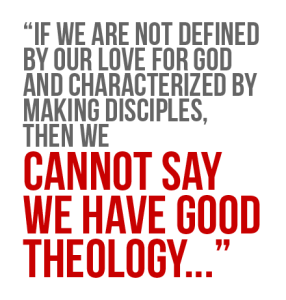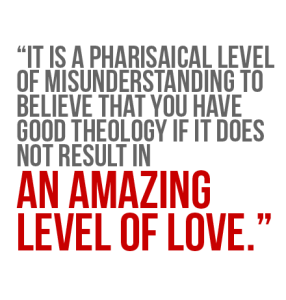
3 Myths About Theology
A scientist cannot say he is a very good scientist if he doesn’t have a firm grasp on scientific principles, the scientific process, and at least basic laws of the universe. In the same way, no Christian can say they know God without valuing theology. It’s the very definition of the word: the study of the nature of God.
In the same way, a Christian cannot say that they have a firm grasp on God or walking with Him if they do not strongly value theology. In other words: If God is important to someone, they will continuously learn about Him.
Yet there seems to be a few disturbing myths floating around (and even becoming prevalent) in churches that tend to value Biblical knowledge more:
1. You Can Have Good Theology Without Action
If I were to say to you, “I have created the most unquestionably amazing soccer strategy ever conceived of by man,” what would you say next (aside from gaping at the audacity of the statement)? Would you not say, “Alright, well let’s see it i n action and we’ll see.” In most things in life, you cannot judge a person’s skill or strategy in something unless they can prove it with action.
n action and we’ll see.” In most things in life, you cannot judge a person’s skill or strategy in something unless they can prove it with action.
The Bible is full of action. James 1 warns against “good” theology without action. He doesn’t say “Yes, you have a great understanding of the Word, you just need to work on living it out more.” He says if it doesn’t lead to action, then it’s “dead.”
I think we often mix up theory with belief. Theory can be treated with abstraction and detachment. Belief drives action. I am cautious when I cross the street because I believe that getting hit by a car will go poorly for me. I do not make a habit of jumping off of buildings because I believe that it will likely cause serious injury or death. Those beliefs define my lifestyle.
If my life was shaped by Matthew 19:29 in the way it is shaped by gravity, then I would never use the word “sacrifice,” at least not in a negative way. But it isn’t, because I struggle to believe that giving up my dreams, my hopes, my desires, my precious possessions, my loved ones… is truly worth it. If I truly believed His promises, my life would look very different.
It is no different in our churches. If we are not defined by our love for God and characterized by making disciples, then we cannot say we have good theology… only good theory.
2. You Can Have Good Theology Without Love
When the Pharisees came to Jesus in Matthew 22:36-40 and asked Him what the greatest commandment was, did He say, “Gain a deep intellectual understanding of God”? No (bear with me, fellow truth lovers). He said that all of the Law & prophets were based on loving God and loving people.
That has stunning implications. It means that if we are studying the Word in order to gain knowledge, then we have missed the point… just like the Pharisees.
When Paul wrote to Corinth, did he say “If I have prophetic powers, and understand all mysteries and all knowledge, and if I have all faith, so as to remove mountains, but have not love, then that’s really good but I just need to work on my methodology more”?
 No, he said “I am nothing.”
No, he said “I am nothing.”
Having good theology is not merely an intellectual exercise, but a dedication to learning how to love Him better and love our neighbors. He gave us the Word so that we could glorify Him more, not so we could treat church like a classroom and congratulate ourselves on our knowledge level. That is what the Pharisees did.
It is the difference between code breaking in a war in order to save lives and playing sudoku. One of them is self-centered and the other serves a purpose in winning the war.
It is the difference between abstract philosophical questions and a military strategy for winning a particular battle.
Love of God and people, and the enemy’s dedicated efforts to deter us from this, are why we study the Word. It is why we must take it seriously, and devote ourselves to the teachings of the Word (Acts 2:42). If we do not, we will love poorly and often for the wrong reasons. If we do not dedicate ourselves to the Word, we may even worship the wrong god.
In light of this, it is a Pharisaical level of misunderstanding to believe that you have good theology if it does not result in an amazing level of love.
In other words, the true strength of a church’s theology is verified by its love for God and others. Without love, it is nothing. (1 Cor. 13)
3. Strong Theology is Optional
I’ve sort of already made this point at the beginning, but allow me to expand on it.
My wife is a very sweet, introverted, and low-key person. If I decided to throw her a booming birthday party with a large crowd, flashing lights, and a DJ, it would be easy to conclude that I don’t know my wife very well.
Theology is, in essence, getting to know God. I cannot say I love my wife without getting to know her, caring about her desires, and learning how to accurately love and serve her. Nor can anyone truly love God without getting to know Him, devoting themselves to the Word, and praying that He aligns your heart’s desires to His (Psalm 119:36).
Let me say it another way: one might be tempted to put action first, but no wise soldier jumps into battle without some understanding of the strategy, objectives, and all that goes into warfare: movement, weapons, tactics, equipment, etc. A soldier will usually start fighting before he’s mastered any of these, but it’s inarguable that a soldier gets better and more effective the more he studies these things.
In the same way, though churches ought to be characterized by action (you might say miraculous works of the Spirit, or social justice), you cannot neglect the Word. If you desire effective social justice, you must read the Word (James 1-2). If you desire to see the Holy Spirit move, you must read the Word (Nehemiah 8). If you desire to serve Him and not idols or the enemy’s lies, you must read the Word (Psalm 1).
So it is my prayer that we guard against making theology meaningless without love, lifeless without action, or tragically misunderstood without high priority.

Leave a Reply